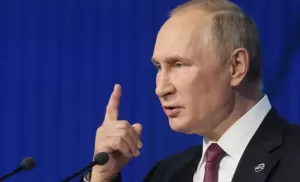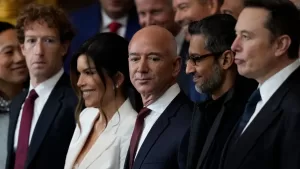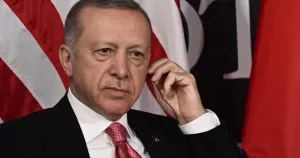Over the Pakistani airwaves, sports commentators frequently groan that the national cricket team – which most people follow with religious fervour – is ‘once again in trouble’. The same lament applies semi-permanently to Pakistan’s politics. This month has seen yet another crisis in the upper echelons of government. To avoid a no-confidence vote that his Party for Justice (PTI) would undoubtedly have lost, Prime Minister Imran Khan asked the President to dissolve parliament and call new elections. This unusual move was necessary, he explained, because the US, backed by the opposition parties, was engaged in a soft coup to topple him. The Opposition appealed to the Supreme Court, asking it to rule on the legality of the dissolution. On 7 April, the five judges unanimously agreed that the government had breached the constitution. They reconvened the Assembly and declared that the no-confidence motion must be brought by 9 April.
There are credible rumours that Khan tried unsuccessfully to sack his Chief of Staff, General Bajwa, and promote his old chum General Faiz Hamid (once head of the Inter-Services Intelligence), while planning to declare a state of emergency. The Army insists no such plan existed, but I have my doubts. Panicking politicians will do anything to retain power. (On the last such occasion in 1999, Prime Minister Nawaz Sharif attempted to kidnap his then Chief of Staff, General Musharraf, by keeping his plane in the air and not letting it land in Pakistan; he was soon out of a job and Musharraf seized power.) Ultimately, though, Khan’s efforts were futile. The Assembly met, the vote was held and the PTI defeated. The next morning, Shahbaz Sharif, president of the Pakistan Muslim League-Nawaz (PML-N) party, was sworn in as the new Prime Minister. Large, predominantly middle-class crowds gathered in the major cities to support the ousted leader. The main chants were anti-American.
Khan was once Pakistan’s most popular cricket captain, and a national idol after the team won the World Cup. This status helped to launch his political career. But unlike in cricket, where generational shifts have produced some fine new players, the country’s political parties rarely change with the times. Dynastic rule ensures that large reserves of capital, often illegally acquired, remain in the family. And the uniformed umpires at military GHQ in Rawalpindi, who make and break governments, are provided with huge grants of land and other perks. A retired senior general in India once complained to me: ‘If only I had been a general in Pakistan, I would not be spending my last years living on the tenth floor of this three-bedroomed apartment for retired officers in Delhi.’ And that was twenty-five years ago.
The basic structure of Pakistani politics can be briefly summarized as follows. There are essentially four political blocs in the country and one overwhelmingly dominant province – Punjab – whose votes decide each election result. Two of those blocs are dynastic parties: the Pakistan People’s Party, run by the Zardari-Bhutto clan, and the Muslim League-N, run by the Sharif family. The first was discredited by large-scale corruption during its reign. Asif Zardari, who served as President from 2008 to 2011, was a wizard on that front. No paper trail, no evidence and, hence, no one eager to betray him to the courts or the National Accountability Bureau in return for immunity. Nonetheless, the PPP was damaged by its shameless profiteering, and at the last general election it lost Punjab to the new kid on the block: Imran Khan and his PTI. Since then, the Zardari-Bhutto clan has been confined to the province of Sind. Its current leader is the young Bilawal Bhutto, who was given the role as a kind of heirloom after the tragic assassination of his mother Benazir. He and his cadre have been noisy but ineffective provincial politicians, who have turned Sind into little more than a despotic fiefdom.
Are the Sharifs any different? Alas not. During their heyday in power, looting public money was virtually institutionalized; Nawaz Sharif was ousted as Prime Minister in 2017 after the Panama Papers revealed that he had stashed millions of dollars offshore – a common practice among the younger Sharif family members. The clan has a power base in the cities, and enjoys support from commercial traders large and small, as well as big capital. As far as Pakistan’s oligarchs are concerned, the Sharifs are currently the safest pair of hands. They know how to run a business, so they can administer a modern state.
Then there is the bloc of Islamist parties, the largest of which is the JUI, led by Maulana Fazal-ur-Rehman. It enjoys some support in the frontier provinces: 26 seats in the Khyber Pakhtunkhwa and Baluchistan provincial assemblies. Despite its supposed piety, the JUI is no less motivated by commercial interests. It struck a deal with a previous PPP government to offer parliamentary support on condition that its leader was given the diesel franchise in his province. Ever since, he has been affectionately known as Maulana Diesel, or just ‘Diesel’.
When the PTI came to power in 2018, the Z-Bs and Sharifs alleged that there had been widespread ballot-rigging facilitated by the Army, but they failed to produce evidence. Notwithstanding the trustworthiness of the final tally, Khan had run a powerful campaign. He promised a fresh start and gained the confidence of young city-dwellers from all social classes, desperate for an alternative to the corrupt dynastic parties and the interference of the military establishment. But to build his electoral vehicle, Khan sought out advisers and fixers who were deeply embedded in the system, having previously worked with every other political grouping. They constituted a core of bandwagon careerists, many close to the Army, whose loyalties were liable to shift the minute they smelled change in the air. Quite a few ran for national and provincial assemblies on the PTI ticket. Most of them won, although the PTI failed to secure an overall majority.
Khan rapidly squandered the goodwill that followed his election victory. Clientelism, a major cause of public discontent, has blighted Pakistan since its inception, and the PTI did nothing to confront it. The departure of traditional industrialists (most of them Hindu) from Lahore and Karachi after the partition of 1947 left a vacuum that was filled by the direct intervention of the state and the dominant political party, the Muslim League. Subsequently, the industrial boom of the early 1960s consolidated a layer of nouveau riche capitalists in Lahore with close ties to the political class (while also enriching the remaining industrialists, mainly non-Sindhi parsis and bohras in Karachi). Today, one of Pakistan’s top five oligarchs is a construction mogul who became a billionaire by leveraging his elite connections to secure contracts for military and civilian projects. Malik Riaz describes himself as ‘Pakistan’s leading real estate developer and philanthropist’. His modesty is deceptive. He bankrolls political parties, police officers and members of the armed forces – buying and building homes for those in power. A recent recording shows him handing over a briefcase containing gold jewellery to one of the ‘First Lady’s’ couriers. The police have, on occasion, assisted his children in intra-elite disputes and shielded him from scrutiny. (This kind of collusion is beautifully captured in Mohsin Hamid’s 2014 novel, How to Get Filthy Rich in Rising Asia.)
Riaz embodies Pakistan’s iniquitous politics. Whether one classifies it as a military dictatorship or a managed democracy, its guiding principle is the reproduction of a filthy rich elite. The country lacks an education system or functioning health service; the poor, both in cities and outlying villages, are regularly evicted so that their land can be stolen and sold at exorbitant prices; the condition of women remains appalling, and on many social indicators Pakistan lags behind Bangladesh. Khan vowed to heal these ailments by ending corruption and building a proper social infrastructure. But in power he did no such thing. Accounts of wild corruption continued to circulate in PTI-controlled areas, with good reason. In lieu of a new social settlement, the government turned to the IMF, whose most recent impositions caused a massive rise in electricity and gas bills, crippling many middle-class households while contributing to rising malnutrition.
All of this was par for the course. But what annoyed leading members of Khan’s own party was the debacle in Punjab, where his wife insisted on handing the role of Chief Minister to the PTI parliamentarian Usman Buzdar: a man that even the most charitable observer would describe as a dim-witted and low-grade politician. The appointment divided Khan’s supporters, angered the Army and played into the opposition’s hands. The Z-Bs and Sharifs publicly accused Buzdar of being little more than a thieving cash-cow for the First Lady. They alleged that she, her first husband and her son were taking a cut from all the business deals he negotiated the province. Buzdar enflamed the situation through his own stupidity, arrogance and gangsterism, antagonizing many in the PTI. Two factional splits, both led by oligarchs, ensued.
As a result of this and other scandals, the opposition parties began to lay the groundwork for a no-confidence motion. Then came the US collapse in Afghanistan and Putin’s assault on Ukraine. After the Taliban’s triumph in Kabul, Khan declared that the Americans had ‘made a mess’: a common view in the region and elsewhere. The US expressed its displeasure at this remark, which was swiftly contradicted by a senior Pakistani military delegation participating in talks at the Pentagon. They reassured their American allies that Pakistan’s foreign and defence policies were decided by the Army, not the Prime Minister. That was that. Yet a few months later, Khan accidentally found himself in Moscow on the day Putin’s troops invaded Ukraine. He adopted the position taken by India and China, refusing to support either Putin’s invasion or the NATO-sponsored motion at the UN General Assembly. Again, this provoked the ire of the State Department, which published a communique singling out Khan for criticism.
At this point, the opposition campaign to eject the PTI mysteriously accelerated. The plotters thickened. Donald Lu, the US Assistant Secretary of State for South and Central Asian Affairs, allegedly warned Khan that there would be consequences if he managed to survive the impending no-confidence motion. It is not uncommon for imperial envoys to issue such threats (though they are usually delivered to the Army, which can be relied upon to call recalcitrant politicians to heel). But Lu’s actions indicate that the UN vote seriously upset the White House, which perceived it as a direct challenge to American hegemony. Shortly afterward, the Biden Administration began to publicly and foolishly threaten China, and it no doubt reprimanded India’s leaders in private. Yet it also paid particular attention to Pakistan, given the country’s nuclear status, proximity to Afghanistan and close links to China. Now, in light of Khan’s insubordination, the hegemon has evidently swung behind the opposition, hoping to install one of its leaders as PM.
The effect of US diplomatic pressure following the UN vote was immediately visible. General Bajwa made a public statement on Ukraine to re-tilt Pakistan towards the US. The bandwagon careerists jumped ship and began negotiating deals with the opposition. Meanwhile, the minority parties that had helped to secure Khan’s majority deserted him. PTI parliamentarians were offered substantial dosh to do the same. Zardari, the wizard of Sind, who had been languishing in hospital, temporarily left his sickbed to join the party games. Well-versed in such political crises, he was trusted by the entire opposition to buy out weak-kneed PTI members, whatever the cost.
Khan warned his wavering MPs of dire consequences, reminding them that he could send goon squads to visit their relatives and openly threatening their children (‘they will be bullied at school’). His actions increasingly evoked the cold-blooded assassination of Fredo (ordered by his brother) in that famous scene from The Godfather II. Indeed, there is more than a touch of the mafia in Pakistani politics. One of the smaller parties, the MQM, runs protection rackets and armed gangs that shamelessly rob and steal. Once part of Khan’s coalition, they’ve now abandoned him as well.
The upcoming national ballot, which must be held by October 2023, will at least bring some temporary relief for the poor, as money circulates in the quest for votes. Election time is when the lowest strata get tiny subsidies from the rich, badly needed to buy flour and sugar. It’s better than nothing. Ideally there would be annual elections. If Khan loses the vote, as he is likely to do, will his successor be any better? Doubtful. None of the contenders offers an alternative to Pakistan’s hyper-corrupt status quo – which, incidentally, is why Khan himself is unlikely to walk away from politics. He believes he’ll get a second chance, even if his wife has to serve time in prison alongside her former husband and son. He may be right, given that he remains popular among the urban middle-classes and petite-bourgeoisie. But whatever Khan’s fate, nothing will change in Pakistani politics for the foreseeable future. The monstrous greed and immovable indifference of the elites brings to mind the words of Abu al-Ala al-Ma’arri, the great secular tenth-century poet from Aleppo:
And where the Prince commanded, now the shriek
Of wind is flying through the court of state:
‘Here,’ it proclaims, ‘There dwelt a potentate,
Who could not hear the sobbing of the weak.’
(Tariq Ali is a Pakistan-born British political activist, writer, journalist, historian, filmmaker, and public intellectual. Courtesy: Sidecar, the New Left Review blog. Sidecar aims to provide a space on the left for international interventions and debate. The NLR or New Left Review is a British bimonthly journal of ideas covering world politics, economy, and culture, which was established in 1960.)




